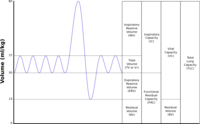
Photo from wikipedia
Asthma in elderly populations is an increasing health problem that is accompanied by diminished lung function and frequent exacerbations. As potent anti-inflammatory drugs, corticosteroids are commonly used to reduce lung… Click to show full abstract
Asthma in elderly populations is an increasing health problem that is accompanied by diminished lung function and frequent exacerbations. As potent anti-inflammatory drugs, corticosteroids are commonly used to reduce lung inflammation, improve lung function, and manage disease symptoms in asthma. Although effective for most individuals, older patients are more insensitive to corticosteroids, making it difficult to manage asthma in this population. With the number of individuals older than 65 continuing to increase, it is important to understand the distinct mechanisms that promote corticosteroid insensitivity in the aging lung. In this review, we discuss corticosteroid insensitivity in asthma with an emphasis on mechanisms that contribute to persistent inflammation and diminished lung function in older individuals.
Journal Title: International Journal of Molecular Sciences
Year Published: 2023
Link to full text (if available)
Share on Social Media: Sign Up to like & get
recommendations!